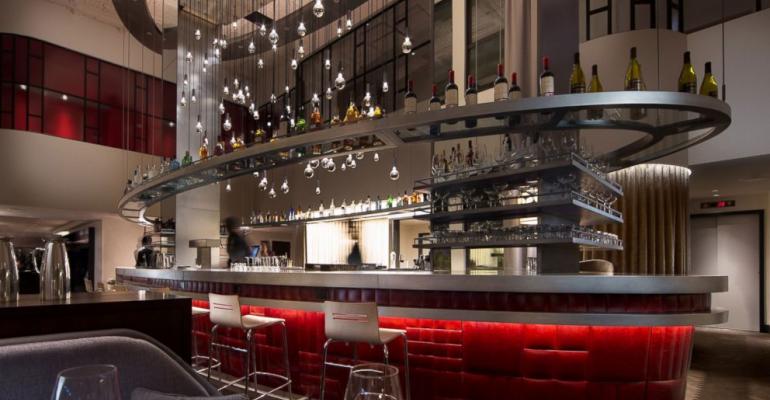Hotel chains are reconfiguring lobby and restaurant areas with a focus on top-floor “sky bars” that add a new level of excitement to guests’ activities.
The trend, which has been around for some years, is getting a new boost from the chase after Millennial customers, who place an emphases on inclusion of social spaces in commercial environments. According to the Global Hospitality Insights 2015 report produced by consulting firm Ernst & Young, hotel operators are emphasizing common areas, lounges and bars as focal points of their properties, inviting guests to spend more time congregating in hotels’ revenue-generating areas.
Bob Neal, principal of the hospitality specialty practice group at architecture firm Cooper Carry, says every hotel brand is working to create more communal spaces. Most guests today want the option to be with other people rather than sitting isolated in their rooms, he says.
“To some degree, they are making these changes because design is becoming more sensitive to social needs,” Neal says. “It’s more fun to sit in an active well-designed space and feel as if you have the choice to take part or just observe. Other than the activities that you can do on your personal communication devices, rooms are nice, but can be boring and often lack energy. The public spaces are not the old stuffy spaces that once adorned all the hotel lobbies. They are ones designed to encourage people to come, see and enjoy.”
Hotel revenues from food and beverage sales have been generally sluggish when compared with the core business of hospitality, according to a recent 2015 hotel study by consulting firm Deloitte. For hotel operators, returns on investment from food and beverage operations was 50 percent lower than that achieved on rooms, according to the report. There are some partnerships that have reached greater success, but many factors must be met for this to happen, Deloitte researchers noted.
Building high-end social gathering spaces, however, can kick-start new food and beverage sale opportunities. Today, the top-floor lounge, or sky bar, is making a comeback, in a big way. Hotels in major markets are building out spaces where guests can kick back with a drink among friends with nice views of the city.
At Hilton’s Downtown Cleveland location, for example, guests can take in views of the downtown area and Lake Erie, while also enjoying a 1,870 sq. ft. bar, a VIP room and a 900 sq. ft. exterior lounge, surrounded by an 8-foot-high glass rail to deflect winds from the lake. The Washington Marriott Marquis has a sky bar with an exterior terrace that provides views of the Washington Monument and Massachusetts Avenue.
Neal says his firm is currently working on six hotel projects that will have sky bars. Cost is a factor, he notes, but can be managed if planned properly, and there’s the added financial benefit of keeping guests at the hotel and having them spend money at the property.
“There are so many choices and so much competition in the market today, it is important to offer a hospitality experience that is unique and will bring guests back for more,” he says. “Demand and occupancies are at record highs, and hotels are starting to drive rates again. The product that is coming onto the market wants to take advantage of this and offer experiences outside of a nice room and a place to grab a sandwich.”
Virgin Hotels has broken into the market by trying to alter all guest expectations, and the chain’s executives are also big believers in gathering spaces. Their properties offer multiple restaurants, which can include sky bar offerings. The chain recently opened the Cerise rooftop bar and lounge on the 26th floor of the new Virgin Hotels Chicago. The hotel opened at the 87-year-old former Old Dearborn Bank Building downtown in January, and now features a 26the-floor lounge that has a terrace facing three sides and two bars to service guests.
Raul Leal, CEO of Virgin Hotels, says the Chicago rooftop bar was carved out of an old elevator machinery room to provide guests with expansive views of the city’s iconic skyline. This type of socialization opportunity is what the Virgin brand is all about, Leal notes, and the firm plans to include them in future properties where possible.
“To me, rooftop bars have been popular for many years now, with hotels investing in the buildout and offering,” Leal says. “We are living in the age of entrepreneurship, where start-ups are popping up every day, and what makes most new companies successful is networking with like-minded individuals and building out your connections. When we created the Virgin Hotels proposition, we knew we needed to provide our guests with options to make socializing effortless, both in the guest room and in the public spaces.”

